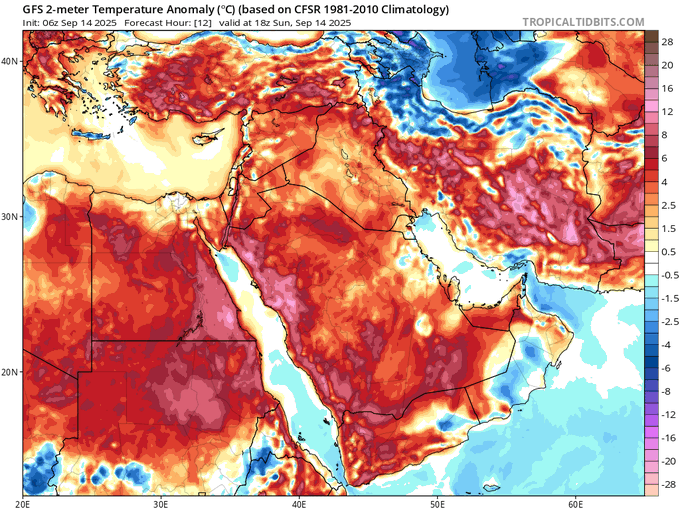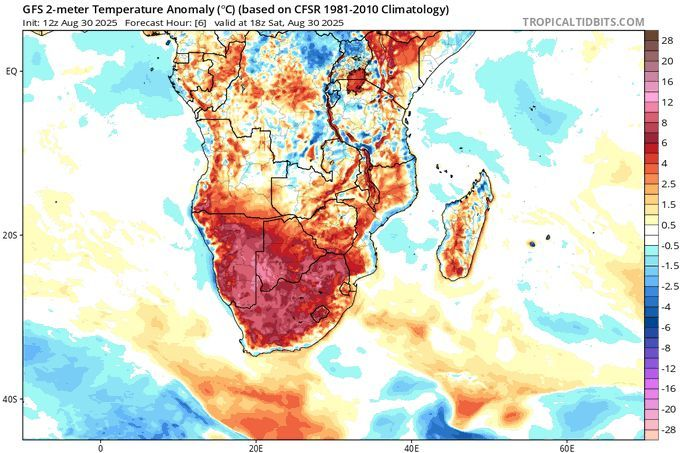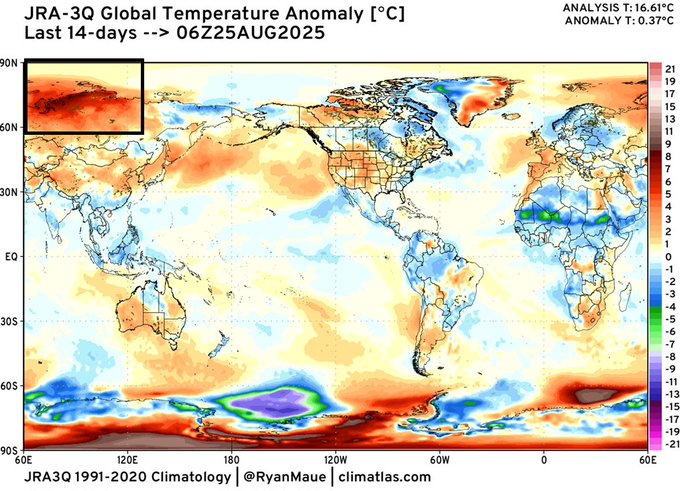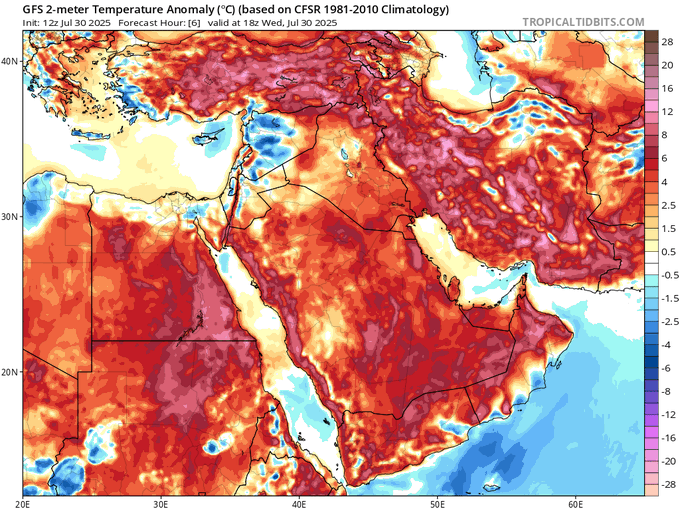(the first six months of 2025 set a new record for global warming damages $101 BILLION)
RECORD DAMAGES: 2024 CLIMATE DISASTERS COST THE US OVER $95 Billion
THE SUMMER OF 2025 COST EUROPE OVER $43 BILLION IN GLOBAL WARMING DISASTERS
Catastrophic floods in Texas, New York, New Jersey, Korea, Venezuela, China, India, South Africa, Pakistan, West Virginia, Burundi, Congo, Romania | Killer Heat and Wildfires in Balkans, France, Portugal, Spain, Eastern Europe, Turkey, Evacuations in Manitoba, Saskatchewan, Megafire and Fire clouds in Grand Canyon and Utah. More Alpine landslides, Killer Algae onslaught fouling AU coasts, relentless floods in Pakistan displace millions.
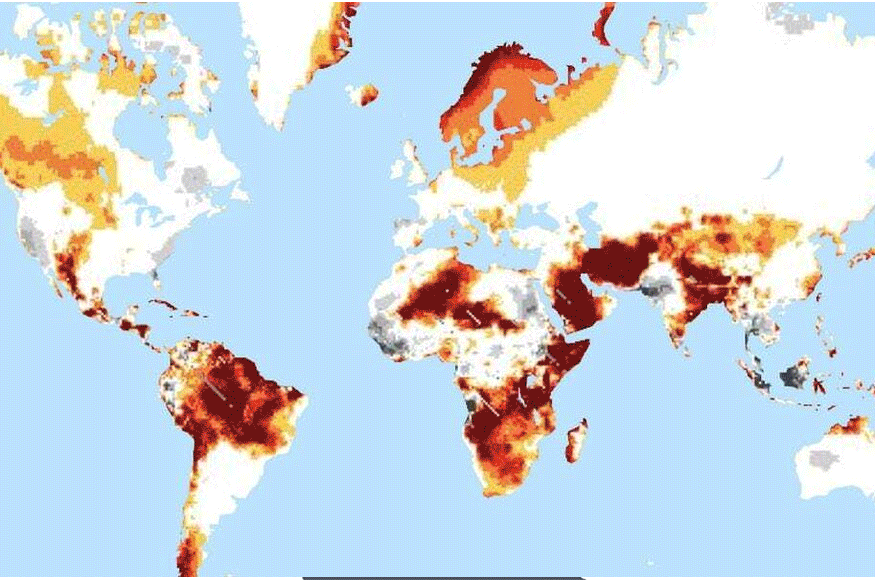
EVENTS
119°F temperature in Saudi Arabian coast in mid-September
More alarming but less obvious is the 95°F overnight lows recorded around Medinah. Beyond the effects on humans, the natural environment is unable to recover at night at this level of heat. Last year, more than 1,300 Haji pilgrims died as heat and humidity exceeded survivable limits.
Many climate scientists now speculate how much longer this entire region will be habitable by the plundering primate species.
.
.

Unprecedented collapse of Caspian Sea water levels
The level of Caspian Sea has always fluctuated, but the scale of recent change is unprecedented. Since the turn of the 21st Century water levels have fallen by around 2.5 in per year, accelerated up to a ft since 2020. In July 2025 the level had dropped below the previous all time low.
As is the case with most oceans, lakes and waterways, the Caspian Sea has been abused by irresponsible water usage. Agriculture and industrial diversions have taken their toll. However, officials now point to global warming as the main cause of the rapid decline. During the 20th century, variations were due to a combination of natural factors and humans diverting water to use for agriculture and industry, but now global warming is the main driver of decline. Quite simply, the rate of water entering the sea from rivers and rainfall continues to fall as heat drive evaporation exceeds recharge. , and is now being outstripped by increased evaporation from the sea surface.

India Flood Death Toll Climbs Past 1500
Since June, millions of Indians have been impacted by catastrophic floods in fifteen states. The regions include Himachal Pradesh, Kerala, Bihar, Punjab, and Jammu and Kashmir. In Himachal alone, the estimated flood damage cost is over 4 billion rupees, he said.
In Himachal Pradesh’s capital city of Shimla, a landslide buried several vehicles in the city center and over 400 people died. The overall death toll now exceeds 1500.
The monsoon is an annual meteorological event but has been supercharged by global heating. Moisture content and energy increases with each upward tick of the thermometer.
Meanwhile in neighboring Pakistan more than 1 million people have been evacuated and 2.45 million people have experienced monsoon flooding this summer.
TRENDS
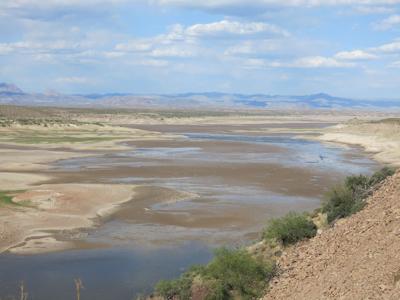
San Carlos reservoir near empty as Arizona drought continues
The critical San Carlos Reservoir may have only a few days of water remaining before it runs dry. The dry-up could leave farmers in central Arizona increasingly reliant on wells and put their crops at risk heading into next year.
As of Sept. 10, the San Carlos Reservoir held just 8,627 acre-feet of irrigation water, according to Brandi Ogle, business manager for the reservoir. By comparison, storage reached about 500,000 acre-feet in 2023. The reservoir can hold about 900,000 acre-feet.
The district, which stretches between Florence and Casa Grande, depends on the Gila River. Water is stored behind Coolidge Dam near Globe in the San Carlos Reservoir, serving both the Gila River Indian Community and non-tribal farmers.
.
.
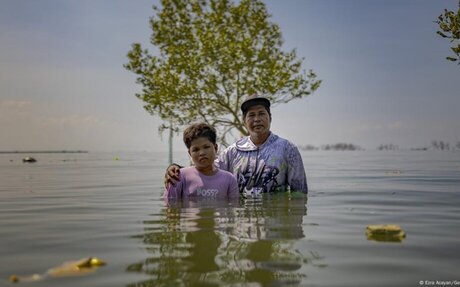
Philippines rising seas are compounded by stupid humans
This photo shows Philippine residents posing where their ancestral home used to be. While the ocean is unquestionably rising rapidly in the Asian coast, developments have altered currents, forcing tides farther inland, almost instantly flooding streets and homes.
The country’s coastal communities have long lived with flooding but as climate change accelerates rising sea levels and reclamation projects reshape Manila Bay, submerging homes under water more often.

Australia facing devastating infrastructure threats
The Australian government has gotten around issue a warning about ‘terrifying impacts’ to human health, infrastructure, the environment, national security and the economy.
Among the more graspable consequence is the likelihood that 1.5 million are at risk from rising sea levels by 2050.
Although climatologists have identified the nation- continent as a global warming canary in a coal mine, the country’s first National Climate Risk Assessment predicts more frequent and severe climate hazards like floods, cyclones, heatwaves, droughts and bushfires.
Australia is one of the world’s biggest polluters per capita. It has already breached the imaginary threshold of 3°C which will result in a 400% increase in heat-related deaths in Sydney and a 3X factor in Melbourne.

Arizona desert life threatened by heat too extreme for the desert
Arizona’s recent extreme heat is killing off animals that should be able to survive it, including rattlesnakes that are being cooked in their dens. After weeks of 110°F+ days, the burrows that should offer refuge from the heat became little ovens that cook them alive.
It’s a trend that is happening across the Arizona desert. Species that are built to survive being baked and broiled are being cooked by climate change, which is worsening faster than their evolutionary traits can keep up with.
.
.

Latvia declares agricultural state of emergency
Latvia’s Ministry of Agriculture has declared a state of emergency for the nation’s entire farming sector as a result of apocalyptic rains and floods over the summer.
Credit institutions and other financial organizations will be able to offer remedies to farmers affected by the historic meteorological conditions in 2025.

Meat prices skyrocket as global warming takes its toll
Cattle farmers in many parts of the world are dealing with climate change and disease, curbing production. Extended drought in key production regions such as Brazil rank high on the list of related causes.
The shortage of beef is also coupled with increased world wide demand, made worse by ranchers selling younger cows to cash in on higher prices. Now that got fewer cows.
The American herd is the lowest in decades and numbers are also tightening in Brazil, with unpredictable extreme weather adding to the challenges to rebuild.
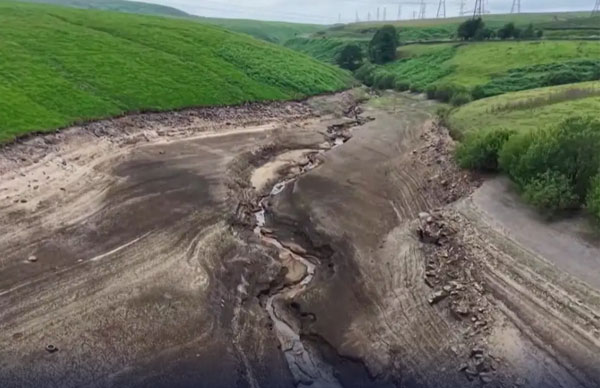
Europe water crisis: It isn’t only arid countries facing shortage
Europe is confronting an urgent water scarcity problem. Even the UK, long considered safe from shortages, now faces dwindling supplies due to rising temperatures and less. Millions of citizens have been facing restrictions as an increasing number of reservoirs run low.
Global warming is the main culprit. Add in outdated infrastructure, increased demand and exploitation by exploitation by corporate water interests and you have the current intractable situation.
Germany is already experiencing historic low river levels, while in southern Europe, up to 70% of people face water shortages during the summer months. Spain, heavily reliant on agriculture and tourism, saw nearly 9 million residents under water restrictions in 2023.
.
.

Methane levels continue rapid increase globally
The world’s methane emissions continue to rise steadily with no signs of slowing as old and new sources create a multi-tier feedback loop that is running out of control.
The thing about Methane (CH4) is that it’s many times more potent than CO2 as a greenhouse gas – as much as thirty times powerful. If you don’t “believe” in Anthropogenic climate effects, this won’t matter to you because you are an idiot, but other people (the ones who are aware of it) find it quite scary.
The other thing about this trend is that it reflects the usual combination of causes: human industrial activity exacerbating galloping global heating.
It is true that leaking methane from petrochemical plunder and industrial animal flesh production has increased CH4 rapidly in recent years, the other half of the equation is damage already done, an irreversible feedback cycle related to thawing permafrost.
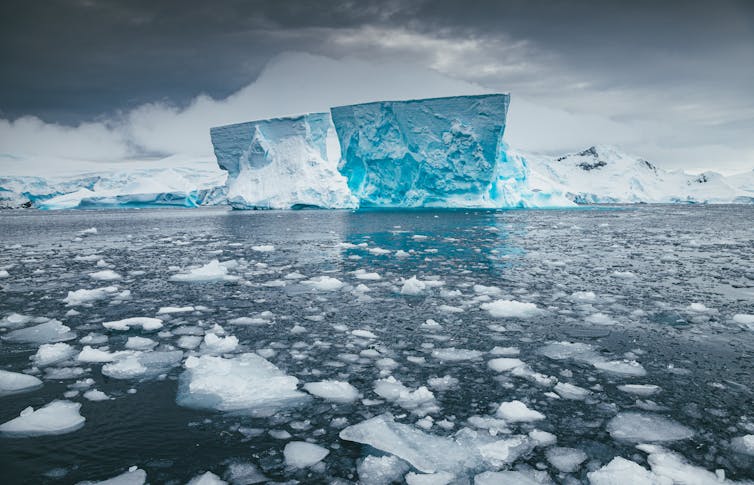
Abrupt decline in Antarctica’s ecosystems
The ice smothered continent that covers the South Pole, along with the Southern Ocean, is undergoing abrupt and alarming changes.
- Sea ice is shrinking rapidly
- Floating glaciers known as ice shelves are melting faster
- Trillions of tons of land based ice sheets are approaching tipping points
- Vital ocean currents are slowing down.
These changes are suddenly accelerating and amplifying individual effects. For example, melting sea ice allows oceans to warm more rapidly, which melts more sea ice. Once triggered, a feedback loop won’t be reversed on timescales meaningful to humans (which may not be all that long).
Over past decades, the Antarctic environment had a much more muted response overall to human-caused climate warming compared to the Arctic. But about a decade ago, these abrupt changes began to occur.
EVENTS

Darfur landslide wipes out village and kills thousands
More than 1000 people are reportedly dead after a landslide struck the village of Tarasin in Sudan’s central Darfur region on Sunday.
According to the warlords in charge of the region, everyone in the village was killed, with estimates exceeding a thousand dead.
The disaster followed several days of unseasonal rains.
.
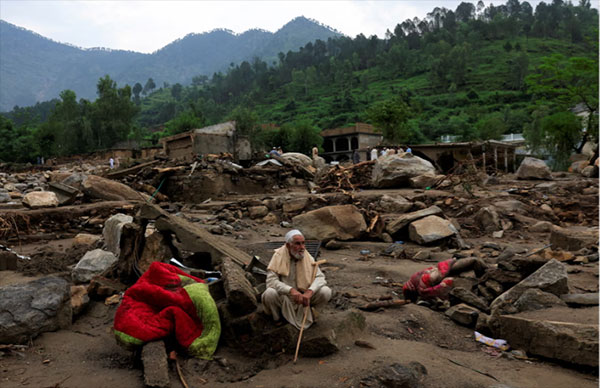
Months of record floods in Pakistan kill thousands
Since the end of June and continuing into September, historical torrential rains and flash floods have smashed Pakistan in the Khyber Pakhtunkhwa and Gilgit-Baltistan regions. The numbers of dead and injured are in the thousands as the rolling disaster shows no signs of abating. Hundreds were crushed in their homes as the buildings collapsed.
Over 2,000 villages were submerged, millions of acres of crops lost, livestock evacuated, and food security threatened—posing risks to export sectors like textiles and rice.
The state of Punjab is facing the worst flooding in history—record rainfall leading to catastrophic inundation over vast areas – inundating villages and farmland and displacing millions.
In 2022 catastrophic floods in Pakistan affected 33 million people, displacing at least 8 million. Losses to food, livestock, and fisheries came to $3.7 billion. Long-term losses are estimated at $9.24 billion.
S. Africa hits 104 °F as spring begins with record heat.
Global warming is hitting South Africa – the continent’s largest economy – harder than most places on this beleaguered planet. As spring 2025 begins, record heat with temperatures of According to climatologists, South Africa is also experiencing increasingly frequent record-breaking heat events. resulting in more extended droughts and a looming water crisis.
EVENTS
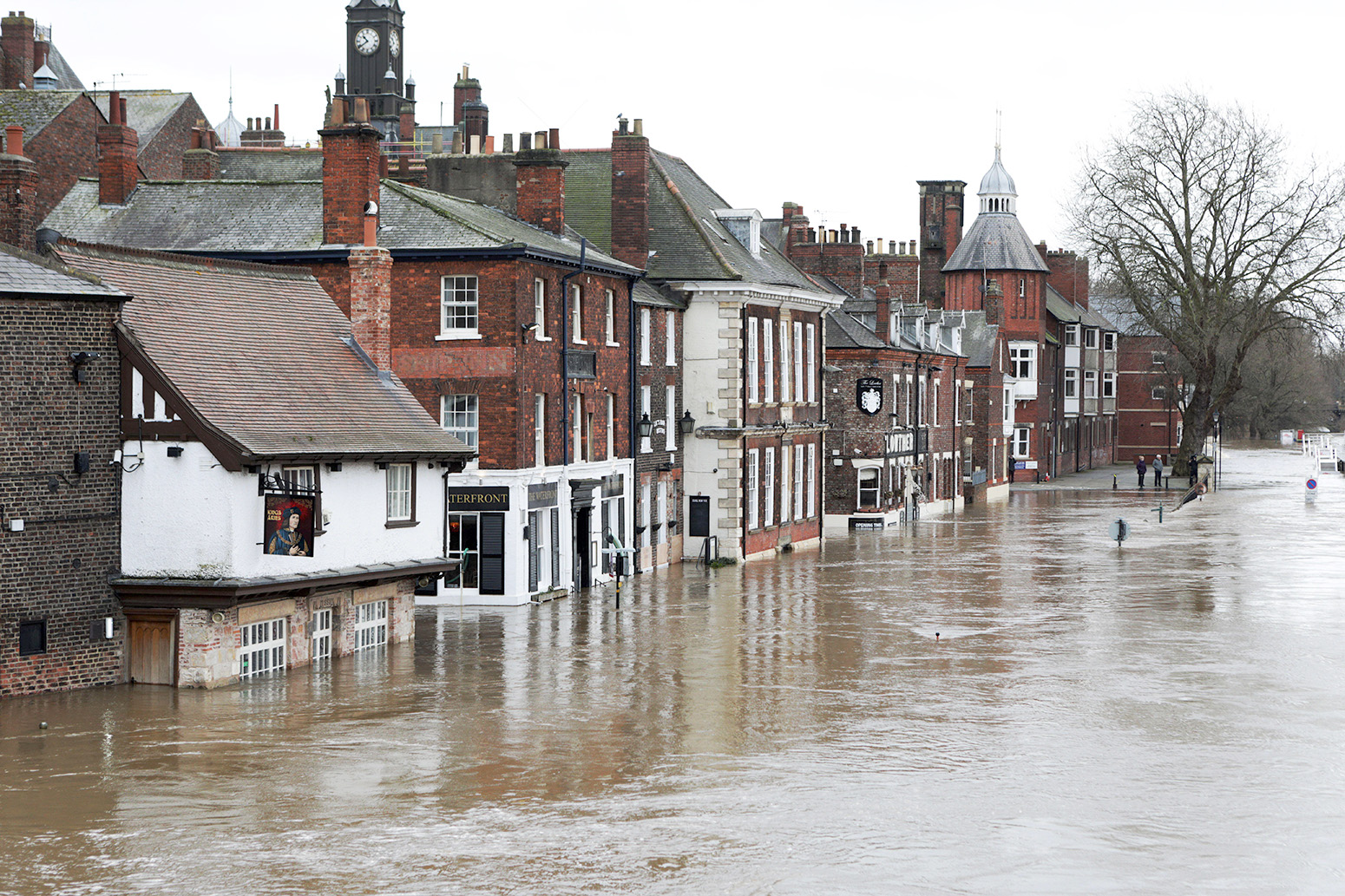
UK’s hottest summer of all time ends with record floods
Heavy rain has brought flooding to the UK after the hottest summer on record.
Flood warnings and alerts were issued across southern England by the Environment Agency (EA) ahead of heavy rain on Friday morning. Parts of the UK have had more than half a month’s worth of rain in 11 hours.
The heaviest downpours were on England’s southern coast between Thursday night and Friday morning, as the remnants of Hurricane Erin were subsumed into a low-pressure system.
Unprecedented heat wave in Siberia continues unabated
2,000 sq mi toxic algae mega blob fouls Aussie coast
A near apocalyptic toxic algal bloom has been killing mass quantities of marine life on South Australia’s west coast for six months, with no end in sight even as summer in the southern hemisphere ends. Scientists say that there is little hope of abatement without a change of the conditions that have continued the incursion for six months. The stinky onslaught, lethal for a wide range of marine life, has fouled miles of metropolitan beaches with daily patrols cleaning the carcasses of dead fish and rays.
Full Story

Historic heat and dry spell killing Iran’s largest lake
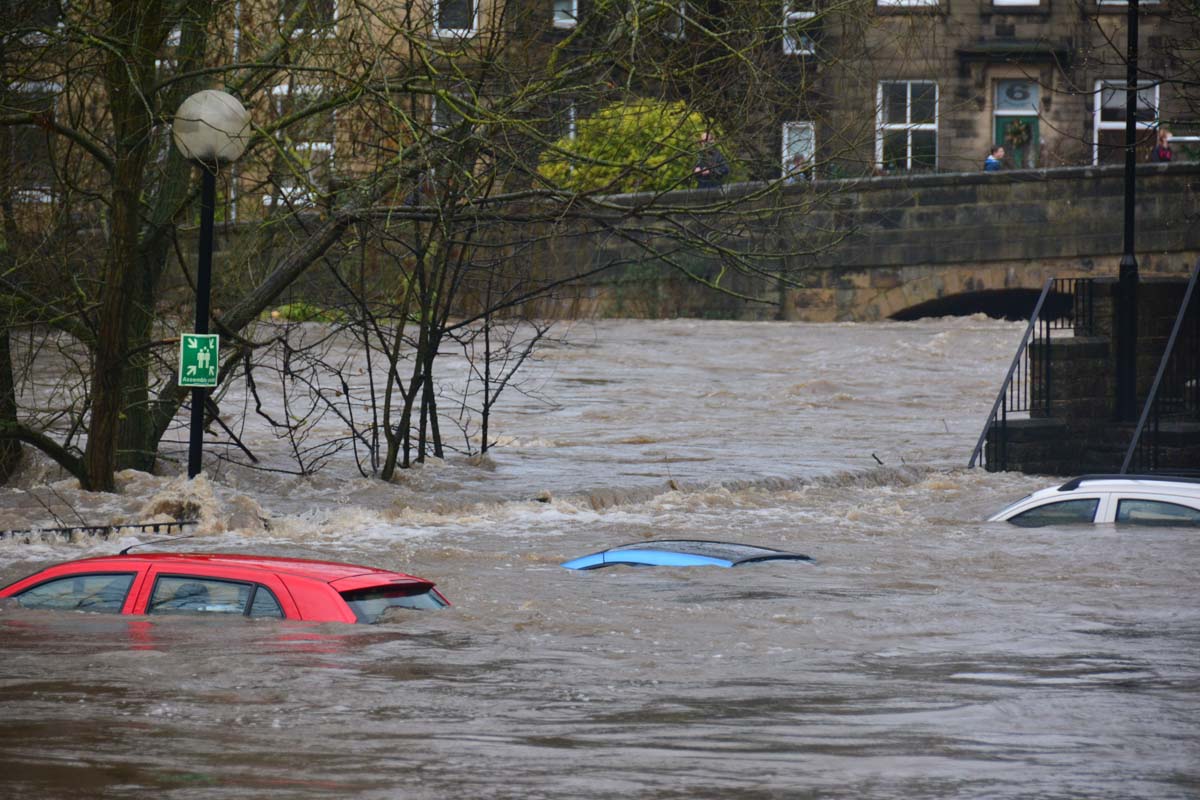
Climate-driven flooding kills thousands in Pakistan

More killer floods in Inner Mongolia cost billions
In China’s Inner Mongolia province, 13 people have been killed in floods caused by heavy rains, reported Reuters. It added that “heavy rainfall and severe floods that meteorologists link to climate change” are posing “major challenges”, including “economic losses running into billions”.
TRENDS

Marine heatwave triggers octopus incursion into UK crab harvest
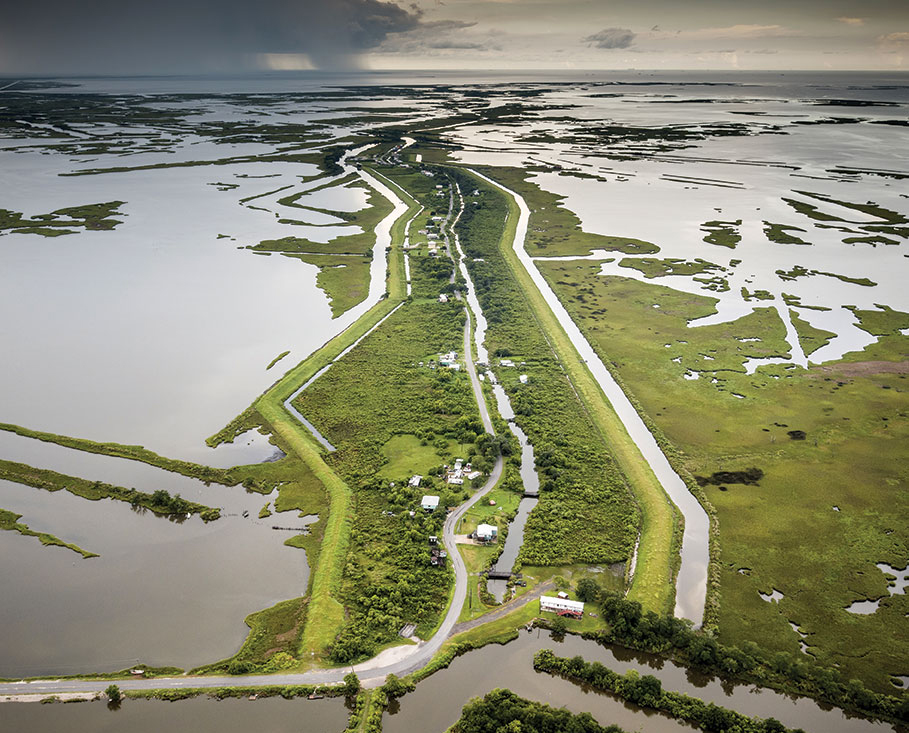
Extended drought threatens Israeli agriculture
The Isle de Jean Charles, LA once, covered over 22,000 acres in the fifties but has now lost 98% of its land due to a combination of rising sea levels, land subsidence, saltwater intrusion, repeated hurricanes, and human activity like oil-industry canal dredging and levee construction.
In 2016, the U.S. Department of Housing and Urban Development granted $48 million to fund the resettlement of the island’s residents to safer ground, about 40 miles inland—to areas such as Schriever, Gray, or northern Terrebonne Parish.
The first round of houses—roughly 30 to 37 homes—has already been built with families already moving. Relocation has sparked complex emotions. While some residents embrace the opportunity, others struggle with the loss of place and cultural cohesion. Relocation projects aim to preserve community bonds and cultural traditions, even as the landscape erodes beneath them.

Russian crop harvest significantly cut
Farmers in southern Russia are facing the potential loss of up to 25% of key crops due to worsening drought conditions in the country’s leading agricultural regions. Krasnodar, traditionally among Russia’s most productive farming areas, has seen yields fall precipitously this year as drought takes its toll. Authorities have declared states of emergency in 30 districts as extreme weather devastates fields of wheat, barley, corn and sunflowers.”

Emergency: over half of Lithuania’s crops destroyed by extreme weather

Displaced Ile de St. Charles refugees first federal climate resettlement
The Isle de Jean Charles, LA once, covered over 22,000 acres in the fifties but has now lost 98% of its land due to a combination of rising sea levels, land subsidence, saltwater intrusion, repeated hurricanes, and human activity like oil-industry canal dredging and levee construction.
In 2016, the U.S. Department of Housing and Urban Development granted $48 million to fund the resettlement of the island’s residents to safer ground, about 40 miles inland—to areas in Schriever, Gray and northern Terrebonne Parish.
The first round of houses—roughly 30 to 37 homes—has already been built with families already moving. Relocation has sparked complex emotions. While some residents embrace the opportunity, others struggle with the loss of place and cultural cohesion. Relocation projects aim to preserve community bonds and cultural traditions, even as the landscape erodes beneath them.

Pakistan floods kill hundreds in new extreme weather event
Torrential rain in northern Pakistan killed almost 400 people over five days, Agence-France Press reported. The rains have caused flooding and landslides that have “swept away entire villages, leaving many residents trapped in the rubble and scores missing” Rescuers evacuated around 1,600 stranded people from flood-hit mountainous districts in both countries. Officials warn that more heavy rain could worsen conditions in the already devastated Himalayan and northern regions.
More heat records burn as Emirates hits 125 °F
UAE temperatures rose to their highest level so far this year on Friday, August 1, with the mercury soaring to a sweltering 125°F in the desert city of Sweihan.
The temperature surge followed the UAE’s hottest April and May on record.
Inland areas repeatedly experienced daily temperatures above 122°F in June and July, while coastal cities Dubai and Abu Dhabi consistently posted highs around 113°F.

Out of Control Wildfires in Turkey shut down Dardanelles
Wildfires in Turkey forced authorities to suspend shipping in the busy Dardanelles Strait, evacuating villages on both shores as blazes were fanned by high winds.
Authorities evacuated three villages and a care home that housed 52 elderly people, the provincial governor’s office said in a statement.
Images broadcast by Turkish media showed firefighters being forced to abandon one of their trucks on a forest road as the flames engulfed it.
Authorities warned of further strong winds mid-month with temperatures expected to reach 95°F.
.
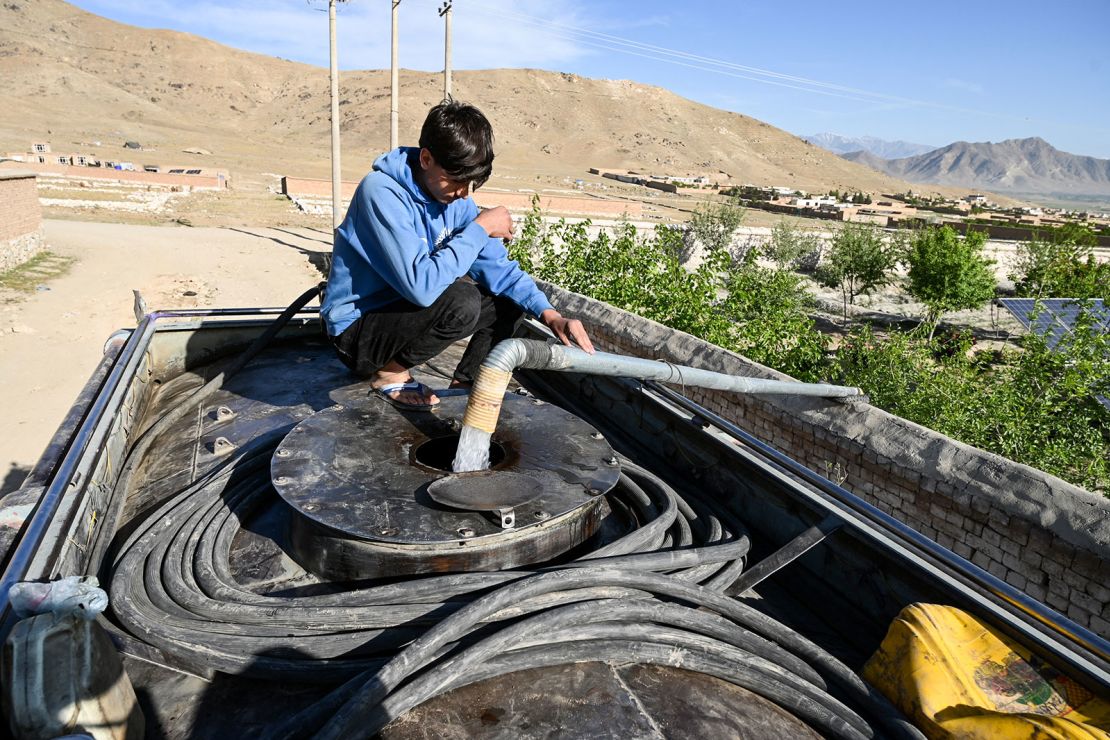
Kabul running out of water fast
The usual triple whammy of dumb human activities combined with the relentless onslaught of global warming is rapidly depleting clean water supplies for the 7 million inhabitants of Kabul. Population growth, the climate crisis, and over-extraction have depleted groundwater levels. About half the city’s boreholes have already gone dry.
In the midst of the crisis, the expected gouging of citizens by criminal water companies is making the situation into a humanitarian crisis that will not be solved.
“We hope for more rain, but if things get worse, I don’t know how we’ll survive.”
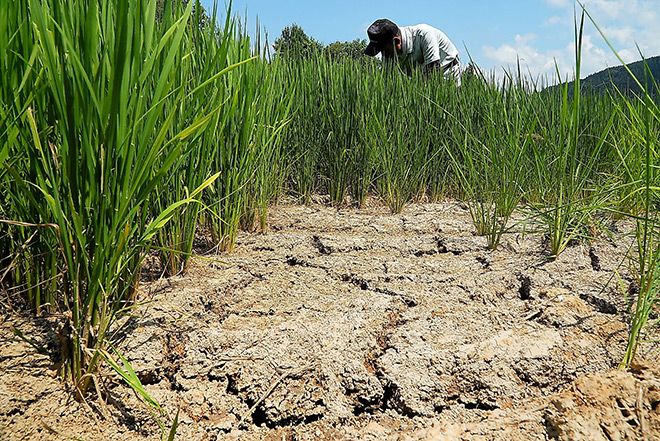
Japanese rice crop threatened as high temp records drop daily
Japan recorded its highest-ever temperature of 41.8 degrees Celsius (107.2 degrees Fahrenheit) on Tuesday, prompting the government to advise residents to stay indoors and promise steps to ease weather-related damage to rice crops.
Record high temperatures in Japan could curb the country’s rice production, threatening to create shortages of the staple grain and fresh price spikes as public resentment mounts over cost of living.

Wildfires force Sardinian tourists to flee by boat
Dozens of beachgoers in Sardinia were forced to flee by boat on Sunday when a huge wildfire broke out nearby, blocking other escape routes, firefighters on the Italian island said.
Strong winds were hindering rescue efforts and a number of automobiles had also torched..

Hong Kong killer floods as 14 in. of rain falls in one day
Hong Kong has been hit with record-breaking rains that have seen schools and courts shuttered, hospitals disrupted, and roads badly flooded.
More than 14 of rain drenched the territory by 2pm on Tuesday – the highest daily rainfall ever recorded for August. More than 9,600 cloud-to-ground lightning strikes were recorded between 5am and noon.
Weather authorities extended their highest “black” rainstorm warning until 5pm local time (09:00 GMT).
This was the fourth such warning issued in just eight days, breaking the record for the most frequent issuance of the city’s highest weather alert within a single year, according to China’s state news agency Xinhua.

Romanian flooding kills one displaces hundreds
The National Institute of Hydrology and Water Management issued Code Red and Code Orange warnings early Monday for the northeastern provinces of Suceava and Neamț after rainfall exceeded 20 gallons per square meter in just three hours, causing the Bistrița River to breach historic levels..

Wildfires force Sardinian tourists to flee by boat
Dozens of beachgoers in Sardinia were forced to flee by boat on Sunday when a huge wildfire broke out nearby, blocking other escape routes, firefighters on the Italian island said.
Strong winds were hindering rescue efforts and a number of automobiles had also torched..

Severe Drought Threatens 25% of Russian Crops
Farmers in southern Russia are facing the potential loss of up to 25% of key crops due to worsening drought conditions in the country’s leading agricultural regions. Krasnodar, traditionally among Russia’s most productive farming areas, has seen yields fall precipitously this year as drought takes its toll. Authorities have declared states of emergency in 30 districts as extreme weather devastates fields of wheat, barley, corn and sunflowers.”

Coastal Trump loving communities fucked by Trump
Cancellation of a FEMA disaster mitigation program is a blow to the flood-prone Trump loving town of Crisfield and a wetlands restoration effort in South Baltimore
For years, a low-lying town at the southern point of Maryland pored over engineering plans to raise its roads, expand wetlands and build a bulwark along the Chesapeake Bay to insulate itself against rising seas.
Federal disaster officials awarded the town $36.2 million for a project to build infrastructure (pointless) to delay multiple feet of flooding every day at high tide..
The Trump administration cancelled Crisfield’s grant earlier this month, along with $882 million around the country through a program designed to reduce communities’ long-term natural disaster risks. According to the state Department of the Environment, the Eastern Shore grant is among $83 million in federal disaster infrastructure taken away from the state of Maryland.

Iran drought grows worse as water supplies reach limits
Iranian authorities have asked people to limit water consumption amid severe heatwaves and a water crisis across the country. Iran is experiencing its hottest week of the year, according to the national meteorological service, with temperatures exceeding 115 °F in some areas.
On top of the extreme heat, the country is in a serious water crisis. Iran has been in drought for five years, with rainfall even lower this year. Negotiations to import water were under way with Turkmenistan, Afghanistan, Tajikistan and Uzbekistan.
The country has hundreds of dams, built from the 1950s onwards but the drought has significantly reduced their output. This, as well as problems with infrastructure and the heatwaves, has led to power cuts across the country.

Record Moscow deluge follows brutal heat wave up to 100 °F
A record-breaking 3.6 inches of rain fell on Moscow, during the night of July 21, 2025, flooding roads, metro stations, and underpasses, and causing widespread transport disruptions.
The extreme storms follow an extended period of record heat, and will likewise be followed by more record heat, with temps expected in the mid-nineties F.

Wildfires still raging in the Balkans & Eastern Europe
High temperatures and wildfires continue to afflict the Balkans and much of Eastern Europe, continuing a streak of what some are calling apocalyptic.
The extreme weather is torching Greece, Serbia, Bosnia and Herzegovina, Croatia, Albania, and North Macedonia. Dozens of wildfires were reported in Macedonia and Albania.
Serbia is bracing for 104°F highs on Friday and Saturday.

Killer heat, killer floods as South Korea hits 100 °F
A lethal pattern of extreme heat, high humidity and record downpours is continuing in South Korea and expected to last the summer.
In mid July, areas of South Gyeongsang Province saw accumulated rainfall over the five days at 32.5 inches. The aftermath of the storms have raised humidity levels to dangerous levels, producing heat indexes of over 100 °F. The record breaking rainfalls caused flood and landslides, killing dozens of people.
The shifting weather patterns are driven by a rogue high pressure system, which has been intensified by record sea surface temperatures.
“With the seas surrounding Korea heating up, the atmosphere is increasingly saturated with moisture. The necessary conditions for intense weather events like this are being met every year.” – Prof Kim Kim Baek-min, Pukyong National University’s Division of Earth and Environmental System Sciences.

Heat Indexes of 133 °F and 140 °F in Dubai and Qatar
The tendency for global warming deniers and skeptics is to downplay temperature reports of excessive heat indexes (or apparent temperatures” because it’s not the “real” temperature. Not surprisingly, this is the opposite of good sense. The combination of the air temperature with humidity is what actually affects the “real” human body and it’s what kills people real fast in these increasingly uninhabitable regions of the planet.
Don’t worry. The “real” temperature related to these heat indexes is a cooooool 115 °F or so.
The region has been setting outrageous high temperature records since May, as the decades long trend continues. The number of extremely hot days has tripled in the past 30 years.
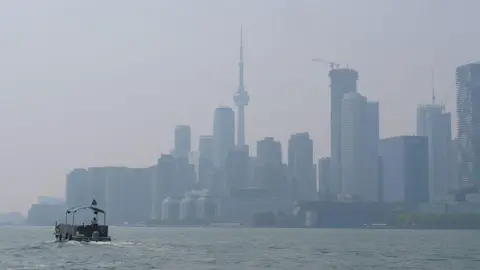
More evacuations in 3 provinces as Canadian wildfires still rage
Air quality alerts are in place across Canada and the northern United States due to smoke from wildfires, with officials warning residents to “limit time outdoors”.
Environment Canada issued alerts for much of Ontario, warning that wildfire smoke had significantly degraded air quality. On Monday, Toronto’s air quality ranked among the worst in the world.
In the US, officials issued similar alerts for Chicago through Tuesday evening, with additional precautions advised for babies and the elderly.
Prime Minister Mark Carney will meet emergency responders to assess the situation in Ottawa, as fires burning in Manitoba, Saskatchewan and northern Ontario have forced thousands out of their homes.

New York | New Jersey floods prompt emergency declaration
New Jersey Gov. Murphy has declared a state of emergency covering all counties after severe storms crashed through the area, killing at least two.
In northern New Jersey, between 3 and 6.5 inches of rain fell, with continued flood impacts expected on July 15, the National Weather Service in Mount Holly said.

Heat driven rains overwhelm UK sewage systems
This is a single example of what is coming for most places that smugly think they are immune from the effects of global warming: Hundreds of sewage spills were recorded across England this as torrential rain overwhelmed water companies’ infrastructure.
Popular tourist spots from Northumberland to Cornwall were polluted with raw waste, as water companies were forced to discharge sewage through ‘storm overflows’.
The causal chain is the usual: Rapid increase in atmospheric water vapor provides more energy for extreme storms combined with short sighted infrastructure decisions and privatization of public water systems.
.
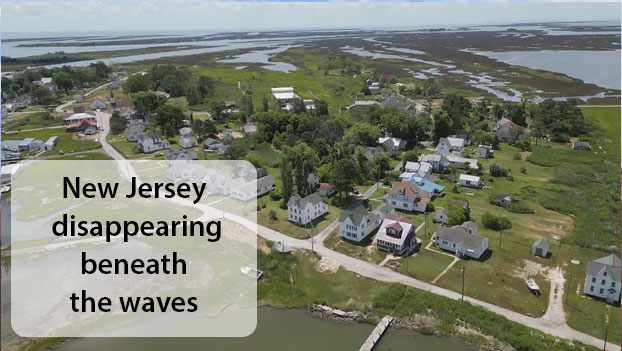
Smith Island, Maryland sinking as seas rise
The sea is claiming 12 feet of shoreline annually as Smith Island off the coast of Maryland disappears beneath the encroaching waves of Chesapeake Bay. Nevertheless, the natives of the Atlantic seaboard island – who describe themselves as gritty and self reliant – will not give up the fight, especially if they can get federal grants to build infrastructure with other people’s tax money. The remaining 200 residents have rejected the State of Maryland’s offers of relocation. It’s another perfect model of subsidized climate change denial.

Last of the “stable” glaciers now in accelerated retreat
Picturesque Perito Morena glacier in Patagonia, Argentina was regarded for centuries as one of the few remaining stable glaciers on the planet. That condition began to change in the past decade as global temperatures accelerated their rate of increase.
Over the past seven years, the glacier has lost 0.74 sq miles of ice cover and its thickness is decreasing by up to 26 ft a year.
“Perito Moreno’s size no longer matches the current climate; it’s simply too big. It can’t withstand the heat, and the current ice input isn’t enough to compensate.” – Dr. Lucas Ruiz.
Of particular concern is the fact that the ice mass once rested on the lakebed, secured by it’s tremendous weight. Now, the ice has thinned to the point that is floats, a condition that will now rapidly accelerated the collapse of the iconic ice sheet.

Hottest night in Kenyan history comes during “cool” season
82 °F doesn’t seem unbearable until you realize that is a new overnight LOW temperature for Kenya. and that it was set during the “cool” season for the region.
Kenya is now experiencing unprecedented nighttime warmth, breaking a national record on July 11th at Lodwar in the northwestern part of the country. July is usually one of the mildest months of the year, especially at night, with average minimums in most expect in the 70’s or lower. The new record is 15°F higher than usual and is furthermore part of an emerging trend. The previous national record for highest July minimum temperature was set in 2024, illustrating These rising minimums are a critical metric in climate science, as elevated nighttime temperatures increase heat stress, reduce the body’s ability to recover from daytime heat, and threaten public health, particularly for vulnerable populations.
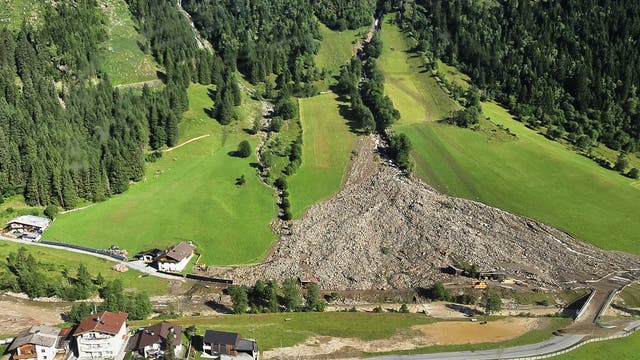
Latest Alpine mudslide buries Austrian valley
Dozens of people were evacuated by helicopter in Austria after a mudslide covered homes and mountain huts in the Gschnitztal valley in Tyrol, the southwestern region of the Alps.
In May, about 300 people were evacuated from Blatten, Switzerland days ahead of a huge mass of rock and ice from a glacier before it thundered down a mountainside, sending plumes of dust skyward and coating nearly all of the town with mud.
The problem is that permafrost that is the “glue” holding rocks and soil together is melting, with predictable results.

New heatwave overwhelms eastern China

Hot ocean waters threaten South Korean fisheries
An early occurrence of intense ocean heat has triggered alarms for Korea’s coastal fisheries, already causing mass fish deaths. Korea’s Ministry of Oceans and Fisheries and the National Institute of Fisheries Science issued high sea temperature advisories for 23 regions including Jeju, the West Sea and the southern coast.
The sea temperature warning level was elevated from level 1 “attention” to level 2 “caution” in a five-tier system, after average water temperatures spiked by by 2 to 4 degrees Celsius over a five day period.
The 2025 high-temperature trend is developing faster and more intensely than last year, with advisories issued more than a week earlier than in 2024..

Olive oil might be the first thing you take for granted to go
Along with coffee, wine and lobster, olive oil will be among the first “you don’t know what you’ve got ’til it’s gone” food stables that wake the general population to reality.
Greek olive oil is a cornerstone of Mediterranean cuisine and a major export product. For a few years now, it has been under under increasing threat from climate change, with both quality and yield in jeopardy.
-
Heatwaves and droughts have become more frequent and intense in Greece. Olives are drought-tolerant, but prolonged extreme heat during key growth phases (flowering and fruit setting) can significantly reduce yields.
-
2023 and 2024 saw some of the lowest olive oil outputs in decades, with 2024 production in Greece reportedly down by more than 60%.
Rare Arctic birds getting rarer fast as tern numbers plummet
Numbers of Arctic terns nesting at a key breeding site have dropped by nearly a third this year, as experts warn climate change and disease are hitting the rare birds.
Some of the UK’s rarest seabirds, including Arctic terns and little terns, nest at Long Nanny, near Beadnell in Northumberland, which is cared for by the National Trust.
But reports from the charity suggest the number of occupied Arctic tern nests at the breeding site has fallen from 1,037 in 2024 to 724 this year, a drop of 30%.

Nuke water is too hot to cool as plants shut down
A record-breaking heat wave in Europe warmed up river water that some nuclear power plants use for cooling, prompting operators to shut down at least three reactors at two separate sites.
“This is the first time the plant has had to be shut down due to water temperature.”
Late on Sunday, operators shut down one of the two reactors at the Golfech Nuclear Power Plant in southern France after forecasts that the Garonne River could exceed 82 °F.
The Beznau Nuclear Power Plant in Switzerland shut down one reactors on Tuesday and the other on Wednesday.
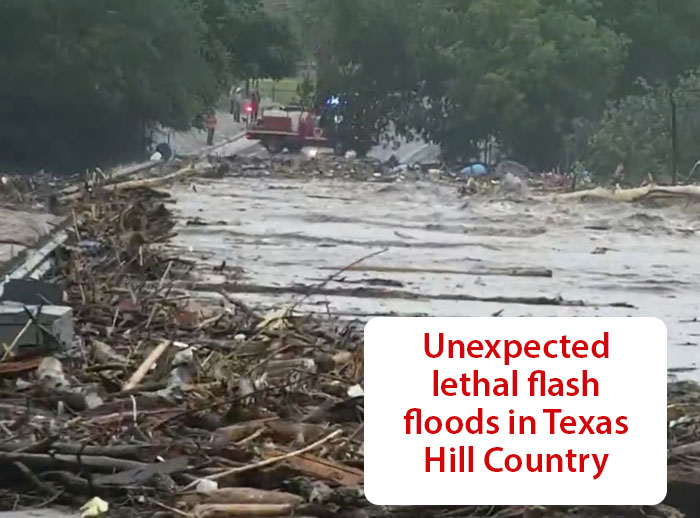
Sudden catastrophic Texas flood kills dozens in growing disaster
Texas Hill Country was beset by death and disaster Friday as at least 70 people were killed and about 20 girls attending a summer camp were reported missing after months worth of heavy rain fell in a matter of hours, leaving search teams to conduct boat and helicopter rescues in the fast-moving water.
Lt. Gov. Dan Patrick said somewhere between 6 and 10 bodies had been found so far in the frantic search for victims. Meanwhile, during a news conference conducted at the same time as Patrick’s update, Kerr County Sheriff Larry Leitha reported that there were 13 deaths from the flooding.
At least 10 inches (25 centimeters) of rain poured down overnight in central Kerr County, causing flash flooding of the Guadalupe River and leading to desperate pleas for information about the missing.

Killer heat and wildfires all across Southern Europe
A massive, relentless high-pressure system is trapping scorching air from North Africa over Europe, bringing at least one more week of debilitating heat. The atmospheric condition has resulted in sustained extreme heat, with daytime highs over 104 °F in many regions and unusually warm.
- France: two deaths , 300 hospitalized
- Italy: red alerts in 18 cities; two men dead on beach
- Swiss reactor shut down due to high river-water temperatures
- Spain: Four dead in Spain, two of them in wildfire
- Turkey: 50,000 evacuated as wildfires spread.
- Crete: 1,000 evacuated ahead of wildfires

California wildfires devastate grasslands near LA
A fast-growing wildfire in central California has become the largest in the state this year, surpassing the size of January’s wildfires that devastated parts of Los Angeles, as the flames spread in hot, windy conditions.
Evacuation orders and warnings were issued for tiny communities near State Route 166 as the flames moved through hilly terrain toward the Carrizo Plain national monument. The region, which lies about 125 miles north-west of Los Angeles, contains vast grasslands that draw visitors in the spring to enjoy its wildflowers.
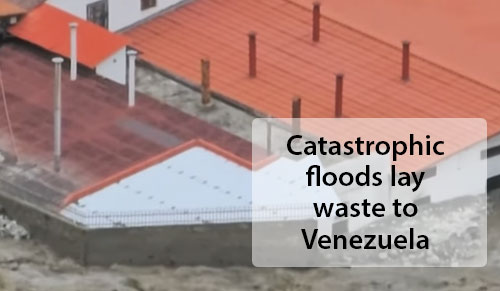
Epic floods devastate Venezuelan towns
Tropical Wave 9 interacting with the Intertropical Convergence Zone (ITCZ) brought intense rainfall to Venezuela on June 24, resulting in severe floods, landslides, and river overflows across multiple states.
According to the Venezuelan Civil Protection and the International Federation of Red Cross and Red Crescent Societies (IFRC), over 4 700 people were affected, either displaced, evacuated, or in need of urgent assistance.

Deadly landslides in Colombia kill dozens
A wall of mud and debris cut loose by torrential rains buried dozens of home and killed dozens of people in Medellin and Bello, Colombia. Fifteen people are missing with the numbers expected to get worse. .

Burundi inundation becomes permanent
Surface temperatures of Lake Tanganyika have continued to climb relentlessly for the past decade, cause heavier rains and increased flooding in the central African nation of Burundi. With the lake swollen, the Ruzizi River is unable to drain into it, resulting in persistent floods that inundate surrounding areas like Gatumba on the northern shore. In the most recent round of flooding 29 people in Burundi were killed with deaths in neighboring countries recorded at 260 in Kenya and 155 in Tanzania. Floodwaters covered entire neighborhoods.
The situation deteriorated further in 2023 as thousands near the capital were evacuated. The floods returned in 2024 and again this spring. With water levels exceeding floods stage more or less permanently, residents adapt by moving to rooftops and traveling by makeshift boat.
